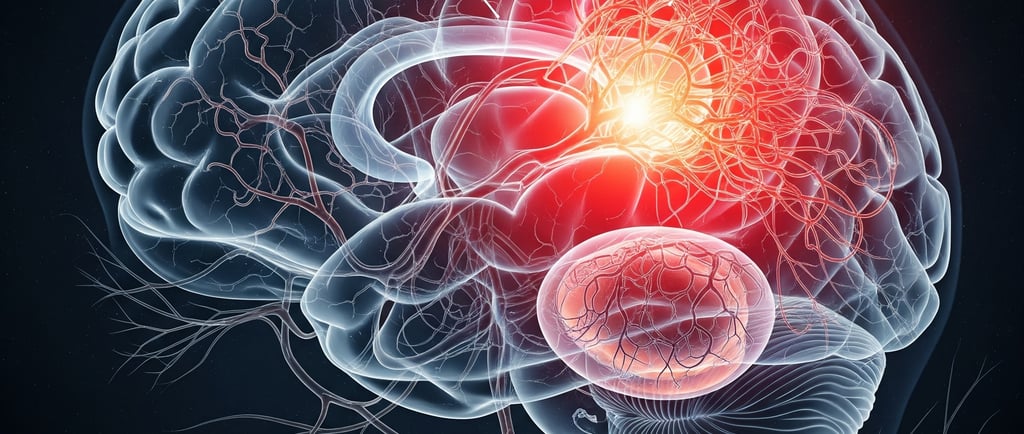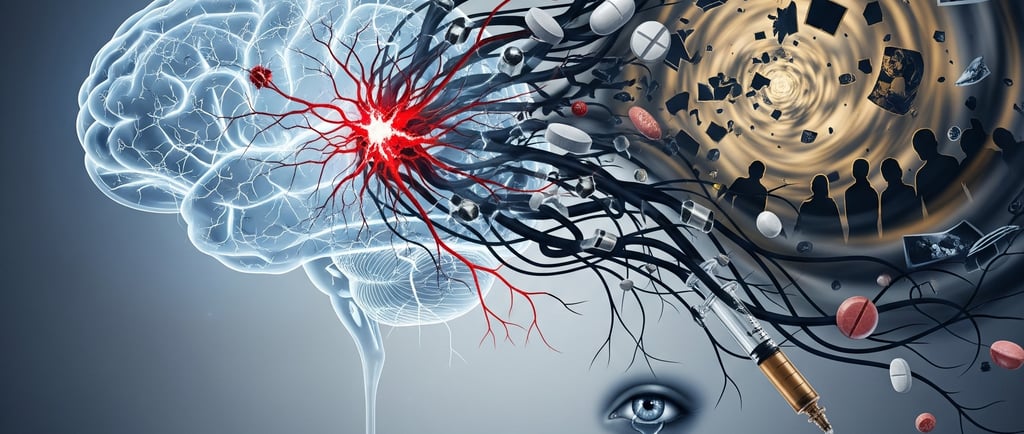Trauma, the Brain, and Addiction
Trauma is a deeply disruptive experience that can leave lasting impacts on the brain, body, and behavior. It can result from a single event, such as an accident or assault, or from chronic experiences like abuse, neglect, or living in a high-stress environment. For many, trauma is not just a past experience, it is an ongoing influence that shapes emotional responses, thought patterns, and behaviors. Understanding the connection between trauma and addiction is essential for recovery and long-term mental health.
All In Health
11/10/20253 min read


How Trauma Affects the Brain
Trauma changes the way the brain functions. The amygdala, responsible for detecting threats and processing emotions, can become overactive, keeping a person in a heightened state of alert. The hippocampus, which helps store memories and contextualize experiences, may be impaired, making it difficult to distinguish safe situations from danger. The prefrontal cortex, responsible for decision-making, impulse control, and emotional regulation, may have reduced activity, making it harder to manage stress and resist harmful behaviors. These neurological changes mean that trauma survivors often experience hypervigilance, anxiety, irritability, and difficulty concentrating. They may also have stronger emotional reactions to stress, making everyday challenges feel overwhelming.
The Link Between Trauma and Addiction
Trauma and addiction are closely intertwined. Substances such as alcohol, drugs, or even compulsive behaviors can be used to cope with the intense emotions and physiological arousal triggered by trauma. What begins as a method to numb emotional pain or escape overwhelming feelings can gradually evolve into dependence and addiction. Trauma can influence addiction in several ways. People may use substances to calm hyperarousal, reduce flashbacks or intrusive memories, or suppress feelings of shame, guilt, or fear. Trauma survivors are also more susceptible to cravings and relapse because stress and emotional triggers affect the same brain regions altered by trauma. Essentially, addiction becomes a maladaptive coping mechanism for regulating emotions that the brain struggles to manage after trauma.


The Cycle of Trauma and Addiction
Trauma and addiction often create a self-reinforcing cycle. The physiological and psychological effects of trauma increase vulnerability to substance use, and substance use, in turn, can exacerbate trauma-related symptoms. For example, using substances to numb distress may temporarily reduce symptoms, but it prevents the brain from processing and integrating the traumatic experience. Over time, this prolongs the emotional pain and reinforces reliance on substances. Additionally, withdrawal and cravings can mimic trauma-related stress responses, keeping the brain in a heightened state of alert and increasing the risk of relapse. Without targeted support, individuals can remain trapped in this cycle, unable to find healthier ways to regulate emotions or respond to triggers.
Trauma-Informed Recovery
Recovery from addiction is more effective when it is trauma-informed. Recognizing that trauma alters brain function and emotional regulation allows clinicians and support systems to tailor interventions to the needs of each individual. Trauma-informed approaches may include therapy modalities such as Cognitive Behavioral Therapy (CBT), Eye Movement Desensitization and Reprocessing (EMDR), or somatic therapies that address the physiological effects of trauma. These strategies help survivors process traumatic memories safely, develop coping skills, and rebuild emotional regulation. Recovery support and coaching can reinforce these skills by providing structure, accountability, and tools to manage cravings and stress. Mindfulness, grounding exercises, and self-care routines can also help regulate the nervous system and reduce the physiological impact of trauma on the brain.


How All in Health Can Help
At All in Health, we understand the profound connection between trauma, brain function, and addiction. Our therapy, individualized recovery support, and coaching approach is designed to help clients navigate trauma while maintaining recovery. Through therapy, clients process trauma safely and learn coping strategies tailored to their emotional and neurological needs. Individualized recovery support provides structure, skill-building, and practical tools to navigate triggers and cravings. Coaching adds accountability, guidance, and personalized strategies to strengthen resilience and reinforce positive behaviors. By addressing trauma directly alongside addiction, clients can break the cycle, improve emotional regulation, and build sustainable recovery.
Final Thought
Trauma leaves an indelible mark on the brain, influencing thoughts, emotions, and behaviors. When combined with addiction, it creates a complex and challenging dynamic. However, understanding how trauma affects the brain and integrating trauma-informed recovery strategies can empower individuals to heal, regain control, and achieve long-term sobriety. Recovery is possible, and with the right support, the effects of trauma can be addressed rather than ignored.
GET STARTED TODAY
Your journey. Our commitment. Together, we’re all in.
STAY IN TOUCH
Contact Us
954-445-1567
© 2024. All rights reserved.
Contact Us
